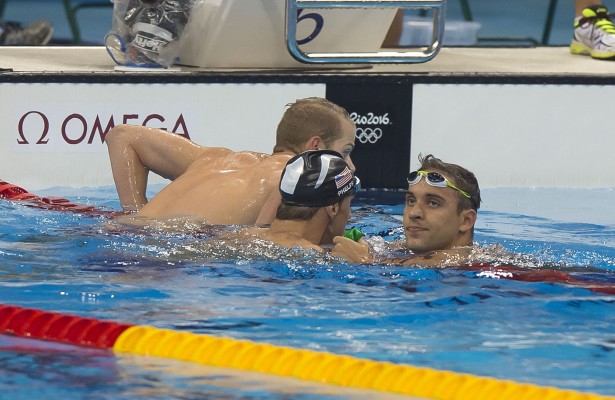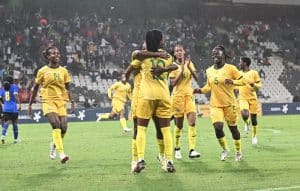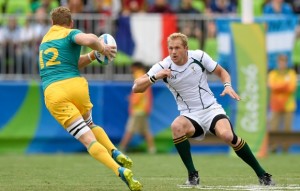After all was said and done, Michael Phelps did his talking in the pool, writes GARY LEMKE.
The American legend claimed the 20th gold medal of his career and stamped himself as one of the greatest athletes of all time when he cleaned up in the most anticipated head-to-head of Rio 2016.At the end of it, Phelps touched the wall first with Chad le Clos, the brilliant young South African who had ripped the Olympic 200m butterfly cloak of invincibility off his back in 2012, languishing in the American’s wake. History will show that Phelps won gold in 1:53.36, and a distraught Le Clos went home with nothing to show for years of preparation. Fourth place in 1:54.06.
Le Clos, bidding to become the only man other than Phelps to retain a men’s 200m butterfly title, came up short. Between him and the imperious American was the charging Japanese Masato Sakai, only four-hundredths of a second behind and Hungarian teenager Tamas Kenderesi third in 1:53.62. Such are the tight margins at this level of sport.
With media scrambling down the steep steel stairs to get into the mixed zone, an experienced, triumphant American commentator said, ‘Did you see, Phelps gave him the [finger] wag afterwards. He served his butt to him on a plate.’ With emotions running high after all the hype, it was hard to argue that Phelps had ‘owned’ Le Clos in this particular race.
By the time those media had got to the area where the swimmers pass through to give obligatory interviews, Le Clos had gone through. There was no coming back. He had no words as he pulled a towel over his head and headed away from the baying inquisitors, a beaten Olympic champion.
Just 24 hours earlier it had all seemed so different. Le Clos bounded out of the pool after winning a silver medal in the 200m freestyle final and was walking on air when, between the freestyle final and the butterfly semi-final, he entered the ready room. Video caught him floating like a butterfly, Muhammad Ali style, taunting Phelps, who sat staring past his smiling tormentor with a look of scowl.
‘Don’t poke the bear,’ warned a former Olympic gold medallist on social media. Le Clos, three Olympic medals, versus Phelps 19 [at that stage] and 23 in total. Yet, the animosity between the pair had been well documented.
Phelps responded by finishing second in that butterfly semi with Le Clos in fourth. Still, the South African remained bullish as he entered his freestyle medal conference closer to 1am than midnight. ‘I’m in the lane next to Phelps in the [butterfly] final and afterwards I hope that we’ll all be swimming the national anthem.’
When he was asked why he was hamming it up in front of Phelps minutes before the semi-final, he replied, ‘Oh, did they get it on camera? We’ve got to do what we’ve got to do. The call room is a difficult place, full of tension, especially before a final, so we’ll see what happens [tomorrow].’
When tomorrow came Phelps was dominant. The pair had stood with backs turned away from one another, in lanes five and six and when all eight finalists assembled on the blocks in this most hyped of races they were told to step back down and the crowd urged to ‘please be silent before the start’. The atmosphere was thick with tension and expectation. Perhaps understandably, on neutral ‘turf’, Phelps was the crowd favourite, although there was no lack of support for Le Clos.
At the second attempt the field got away and Le Clos launched quicker. However, at 50m it was Laszlo Cseh, the 30-year-old world champion from 2015, who led the field, followed by Phelps and Le Clos. Phelps turned best of all and propelled off the wall, taking the lead down the second 50. At halfway he turned in 53.35, followed by Cseh and Le Clos.
Was this London all over, with the South African digging deep and coming home the strongest in the last 100? The intent was there on the third 50 as Phelps stretched out to half a second, chased hard by Le Clos. Turning off the all for the sprint home however, Phelps wasn’t going to be denied, as he had in London. With the crowd in full voice, the American kept finding more and instead of Le Clos closing on him inside the final 30m it was Sakai in lane seven and then the young Kenderesi in lane four. Interestingly, the winning time in London was 1:52.96. Phelps, now 31, was slower than four years ago, but then again, the younger man (24) has not come close to breaking 1:53 subsequently either.
Phelps had done it. The legend had rewritten the script. By the end of the night he had collected a 21st gold, as if to emphasise his greatness.
For Le Clos and his army of South African fans there were no words, quite literally. Only tears and utter, utter, despair.
It was left to his long-standing coach, Graham Hill, to provide the soundbite and he reckoned ‘it was not his night’.
‘At the 150m all was good, 1:23.3, that’s what we wanted it to be. But he didn’t have it in him to come home. Hats off though to Michael, he’s a true champion and he put on a big show tonight. But we’ve still got the 100 ‘fly to come, and I’m sure [Chad] will be be back and challenging on Friday night.’
Phelps later spoke about his rivalry with Le Clos. ‘We are competitors. I don’t want him to win and I’m sure he does not want me to win. He is a very good racer and is not afraid of putting it on the line. I watched him do that in the 200 free. The kid has got talent. I knew exactly where he was most of the race and knew kind of going into the last wall as soon as I saw where he was, I thought “perfect”.
‘But the last 10 metres were not fun. Oh my gosh, I thought I was standing still. He and I have not spoken that much here. That was the first time after the race. Kind of what happened four years ago stuck with me. It was a frustrating race for me and it’s good for the sport to be able to have a competitor like that.’
Image of Phelps and Le Clos by Christiaan Kotze/SASPA




